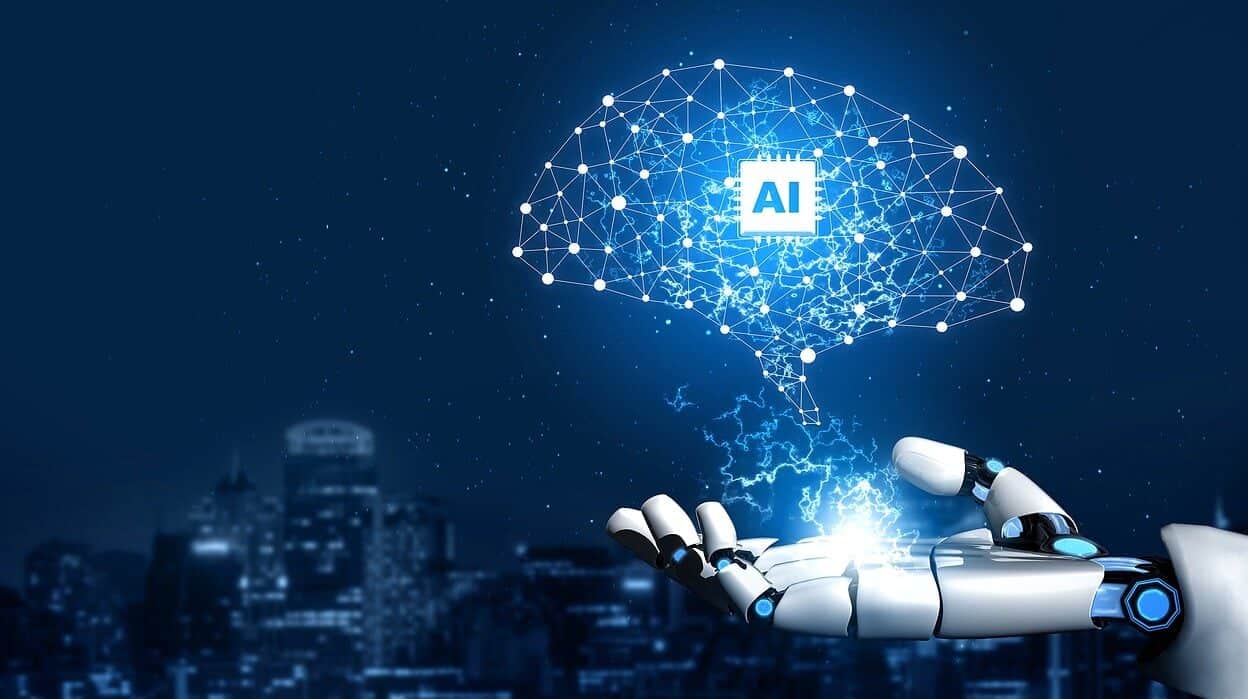Not too long ago, remote work was reserved for a few professionals, mostly in the tech industry. However, the challenges posed by years of pandemic forced the job market to adapt and redefine itself. Nowadays, 26% of the jobs available in the US are exclusively remote, while hybrid models make up over 50% of the market. Traditional on-site jobs are freefalling, now accounting for 19% of the offers.
Artificial intelligence is also making the sudden rise of remote jobs possible. It is behind the automation of a wide array of tasks, from project management to cybersecurity. Despite its multiple benefits, AI also raises many challenges for businesses, professionals, and society in general. Here’s how AI is likely to keep transforming the job market in 2025.
The Role of AI and Automation in Various Industries
Artificial intelligence and automated solutions are everywhere these days, from finance to healthcare. In any case, some of the benefits are the same: improved accuracy, cost-effectiveness, and streamlined operations. Yet, each industry has its own way of making the best of them. Even when they can’t automate a process, these tools become incredibly useful assistants in skilled hands.
AI in Healthcare: Enhancing Efficiency and Precision
AI is bringing accuracy and speed to diagnostics and the healthcare industry as a whole. AI-powered software has become the best ally for managing patient data and tracking lab results. More impressively still, such software can scan medical images with incredible precision, predicting health issues in the very early stage.
Quite often, these tools capture subtle patterns that would escape the human eye. Artificial intelligence also improves treatment decisions based on data and predictive analysis. Since they can track a patient’s health conditions in real time, they also allow for timely intervention. Such interventions can be the difference between the life and death of a patient.
Automation in Manufacturing: The Path to Smart Factories
The future is smart, and the manufacturing industry is already in it. Last year, the smart manufacturing industry reached USD 223.6 billion and will grow to nearly USD 1 trillion by 2032. Automating a factory requires a complex array of technologies, and AI is behind almost all of them. It also requires a varied pool of specialists and employees who are ready to work in collaboration with automated robots.
The integration between AI and IoT (the Internet of Things) can do wonders for the existing workflow, making it much more dynamic, precise, and cost-effective. Successful examples of smart factories include Siemens, Bosch, and General Electric. However, the increasing reliance on interconnected digital systems raises a challenge: reinforcing cybersecurity. Back in 2022, cyberattacks on smart factories made up nearly 25% of attacks on industrial targets.
AI and Automation in Finance: Streamlining Operations
Streamlining operations is no longer a competitive edge but a necessity for companies that wish to stay afloat. Indeed, AI created its own niche in the financial world, and its use generated a revenue of USD 38.8 billion last year. More impressively still, this market is expected to cross the USD 190 billion mark by 2030.
On the business level, AI-based tools can automate complex and time-consuming tasks like predictive analysis, account reconciliation, and financial planning. By automating such processes, businesses can focus on what really matters: strategic market decisions.
Gambling and Entertainment: How AI is Shaping the Digital Workforce + about Crypto and Crypto Casinos such as Bety
AI has become a real game-changer in the gambling and entertainment industry. Thanks to it, crypto casinos and betting platforms like Bety can create a tailor-made user experience, improve odds calculation, and speed up the development of new games. Now, players can count on 24/7 support in multiple languages via chatbots. AI is also instrumental in cybersecurity, preventing fraud and data leaks.
The increasing digitization of the gambling industry has opened new tech job positions in the market. IT professionals, especially project managers, system administrators, help desk specialists, and service desk specialists, are in high demand. The iGaming industry was born in the digital space, and it has been perfectly adapted to it.
The Changing Nature of Jobs and Skills
There’s a new tool in the box, and the job market needs people who can operate it. The demand for AI and IT specialists has never been so high. Meanwhile, professionals from more traditional fields, such as healthcare, have been increasing their usage of AI-related tools.
New Job Categories Emerging in the AI Era
Despite the myth, artificial intelligence doesn’t work alone. The emergence of AI-based systems has created a demand for IT and tech-related jobs. It’s difficult to find a competitive company that can do it without cybersecurity experts, big data analysts, and automation specialists. Quite interestingly, AI and digital technologies are also very useful in roles where the human touch is indispensable, like caregiving or nursing. Nowadays, nearly every professional needs some degree of familiarity with AI tools to enhance their performance.
Skills in Demand: What Workers Will Need to Succeed
Artificial intelligence is a pretty broad field of expertise. Successful projects involving this technology also require a varied pool of specialists. According to the US Bureau of Labor Statistics, there are over 375,000 job openings related to artificial intelligence annually.
The AI engineer is one of the most valued professionals at the moment, with salaries above USD 100,00. Natural language processing engineers, research scientists, data analysts, and AI business strategists also appear at the top of the list.
Challenges and Opportunities in the AI-Driven Job Market
While the full potential of AI is yet to be discovered, its progress can’t be left to chance. Unplanned automation can lead to massive unemployment, with negative impacts all over the economy. Besides, it’s a new tool, which means not everybody knows how it works.
Since there’s still a scarcity of AI-trained professionals in the job market, many companies have decided to foster homegrown talent. For these companies, the solution to all challenges is simple: invest in educating the workforce.
The Impact on Job Displacement and Inequality
The automation revolution backed by artificial intelligence also has a negative side. Since machines and software can handle much of the work, job displacement has become alarmingly common. If this issue is left unaddressed, 800 million workers can lose their jobs by 2030, directly impacting social inequality.
While the world is amazed by this technology’s seemingly limitless potential, much work remains to ensure its ethical use. Virtual assistants and chatbots, for instance, have taken the customer services sector by storm. Even white-collar jobs in finance or administration have been reduced by artificial intelligence.
The uncontrolled use of AI to replace the human workforce can lead to disastrous social effects. Worse still, after being displaced, several professionals struggle to get back into the job market, widening the existing inequality gap. In this context, ethical corporations invest in inclusive policies, retraining programs, and other mitigating measures.
Upskilling and Reskilling: Preparing the Workforce
Replacing a company’s entire workforce with tech-savvy individuals would be too drastic, if not draconian. Thankfully, such extreme measures aren’t necessary. Indeed, many companies have been discovering the benefits of educating their employees to use AI tools and assistants most efficiently. Enter the concepts of upskilling and reskilling.
While both concepts relate to training new technologies, they’re slightly different. When a company wants an employee to learn how to use AI tools from scratch, it invests in reskilling programs. In contrast, upskilling programs are designed to improve the abilities of someone who’s already trained in this technology. In any case, the benefits are tremendous. There’s a considerable gap between the availability and demand of AI-trained professionals in the job market.
Companies in the finance, manufacturing, and healthcare sectors have been intensively reskilling their professionals. While it’s impossible to replace a nurse with AI software, nurses can work much more efficiently if they know how to use these tools. The manufacturing industry had to reskill its workforce when it decided to put AI-powered robots alongside humans on the factory floor. Financial institutions rely heavily on artificial intelligence for cybersecurity and fraud detection, which means the professionals involved must also be trained.
The Future Outlook: What to Expect by 2025
AI is the backbone of the new industrial revolution, and as it improves, it becomes more important to the business world. Specialists forecast an even more accelerated adoption of artificial intelligence in the next few years, and new functionalities will likely emerge. More than automating repetitive tasks, a newly invented AI-powered software proactively engages with clients and makes its own decisions based on output: the agentic AI.
Additionally, 2025 might be marked by the increasing integration between artificial intelligence and cloud computing as both technologies mature. The combination of those technologies allows for the remote management of vast amounts of data in real time. Since the technology landscape evolves at neck-breaking speeds, more companies are likely to invest in reskilling and upskilling programs. Indeed, there isn’t an industry or individual who can’t benefit from artificial intelligence when using it consciously and ethically.




